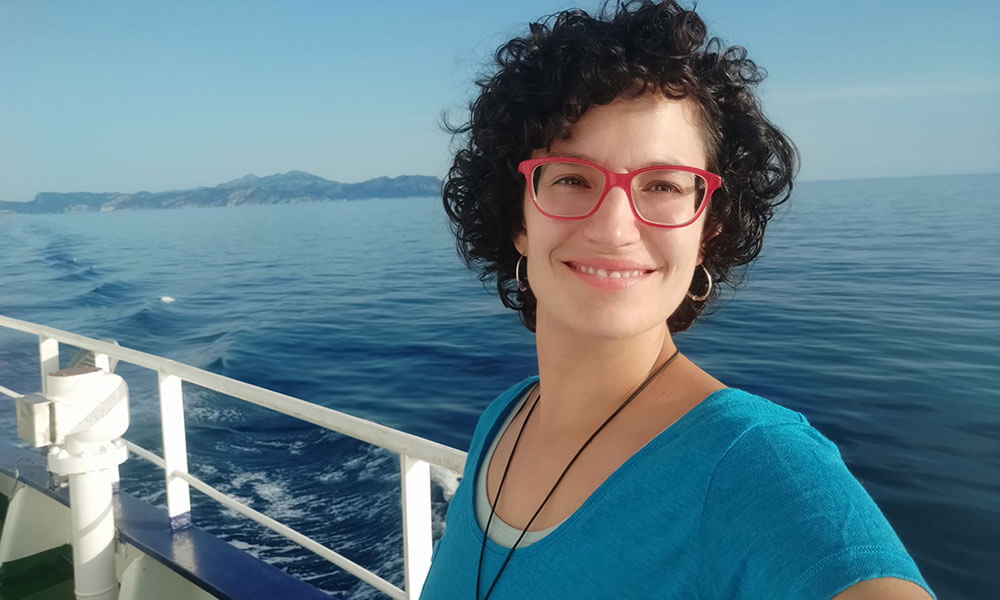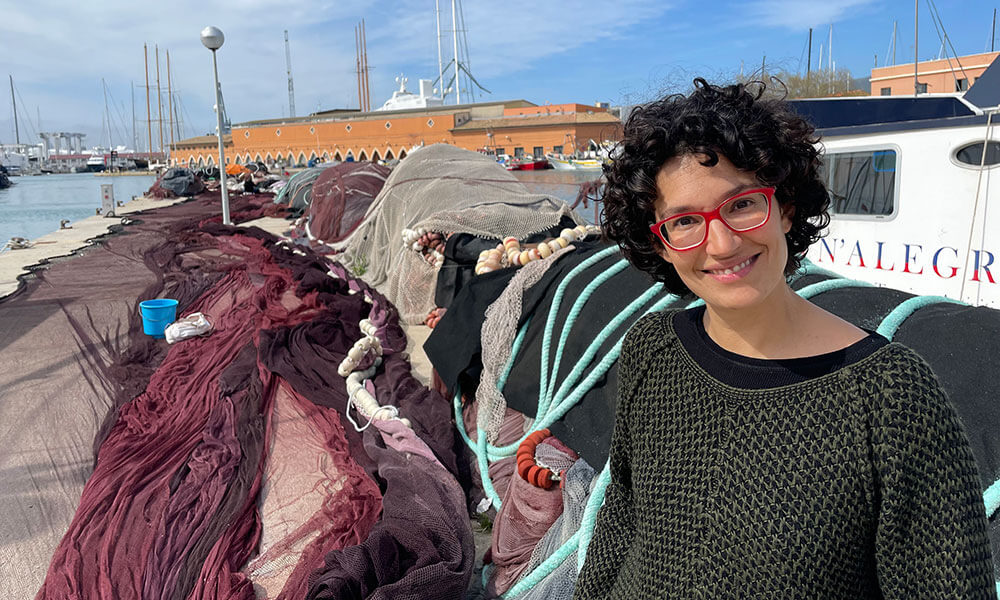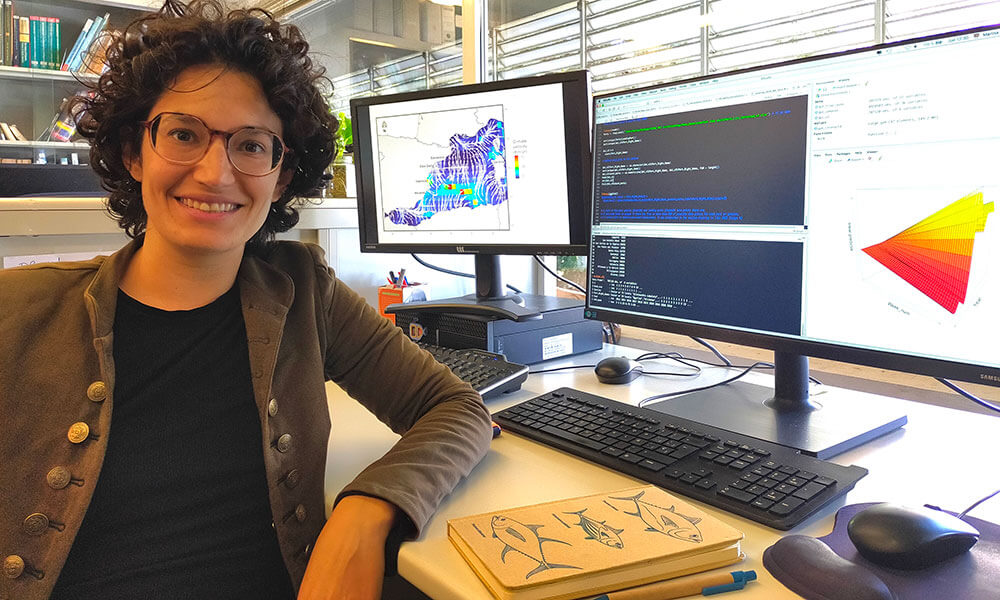
With over 40% of the global population living within 100km of the coast – a trend on the rise – and increasingly exposed to climate risks, urgent and innovative adaptation solutions are needed to face the many and diverse challenges to the communities and the ecosystems in these areas. Through a joint call for fellows launched by the AXA Research Fund and UNESCO’s Intergovernmental Oceanographic Commission as part of the Ocean Decade, seven ground-breaking postdoctoral research projects have been endorsed as part of the Ocean Decade and will strengthen science-based interventions for coastal livelihood preservation and resilience.
Dr. Marina Sanz-Martín, oceanographer and expert in climate change ecology, is one of the seven recipients of the AXA Research Fund – IOC/UNESCO joint post-doctoral fellowship (Vicenç Mut Programme, CAIB). The focus of her research project – CLISSARTES (CLImate-Smart Strategies to develop resilience of ARTisanal fisheriES in Mediterranean Marine Protected Areas) – launched in September 2022 is to analyze the climatic risk of marine ecosystems in Mediterranean Marine Protected Areas (MPAs) and the service they support to develop strategies to increase the resilience of fishing communities.
“My research in climate ecology, biodiversity responses and oceanography focuses on the vulnerability of fisheries resources in the face of changing ecosystems,” says Marina. “Through different approaches in climate change ecology, including the use of climate velocity, we can track and predict species shifts in response to warming and help to find solutions to the challenges that the ocean is facing.”
The ocean is under increasing threat from climate change, evident in variations in temperature, acidification and sea-level rise. “These multiple stressors are affecting the health of marine ecosystems, in turn jeopardizing the lives and livelihoods of coastal communities who depend on fisheries and other marine services,” she warns. “Studies have shown that MPAs can mitigate the damaging effects of climate change on marine ecosystems, sustain small-scale fisheries and restore overexploited stocks.”

MPAs are geographically distinct zones for which protection objectives are set. They constitute a globally connected system for safeguarding biodiversity and maintaining marine ecosystem health and the supply of ecosystem services.[1]
An assessment conducted by the Regional Activity Centre for Specially Protected Areas (RAC/SPA) and the Mediterranean Protected Areas Network (MedPAN) demonstrated that 8.33% of the Mediterranean Sea was under official designation of a protected statute in 2020.[2] Information about the climate risk exposure of marine biodiversity and ocean-based solutions in these zones, however, remains scarce.
Similarly, design and management strategies of MPAs lack a climatic mid- and long-term perspective. Cost and investment strategies require data and knowledge to develop adaptation plans to better protect coastal environments and prevent climate damage, both in the short and long term.
During her two-year AXA Research Fund fellowship at the Spanish Institute of Oceanography, Spanish National Research Council (IEO – CSIC), Dr. Sanz-Martín will work to address the knowledge gaps on MPAs in the Mediterranean Sea. She will assess the climate risk exposure, the connectivity between MPAs, the vulnerability of commercial fishing species in these areas and their associated socio-economical costs.
She will also identify potential mitigating areas of climate change that play a climate refugia role, areas where invasive species are likely to increase due to empty niches of climatic migratory species and areas of increased species movements among other regions.
Her research will be most relevant to the achievement of Ocean Decade Challenges 2 and 5, which aim to protect and restore ecosystems and biodiversity, and unlock ocean-based solutions to climate change, respectively.[3]
Since the project was launched, Marina was awarded for her very engaging presentation on climate change and resilience in the Mediterranean Sea at the Annual Science Conference (ASC) of the International Council for the Exploration of the Sea (ICES) in Dublin, Ireland. She and her team are also close to publishing a new study where they identify surprising and unexpected shifts in a large number of fishing-target species that are tracking climate velocity in the Western Mediterranean Sea. In the next months, she will also present her work at three different conferences: the 5th International Symposium on the Effects of Climate Change on the World’s Ocean in Bergen, Norway; the International Symposium on the Human Impacts on Marine Functional Connectivity in Sesimbra, Portugal; and the Aquatic Science Conference (ASLO) in Palma, Spain, where she will coordinate a session on climate-smart management.

Since the AXA Research Fund fellowship started, Marina has also participated in two courses on Machine Learning tools and Science Productivity, attended meetings with the coordinator of the Climate Assembly and policy-makers of the fisheries sector in the Balearic Islands, and taught different seminars related to her field of research. Her team presented the AXA fellowship at the Spanish Institute of Oceanography and during the IX International Congress of Agroecology, in the session ‘Sowing initiatives with transformative potential in the fishing sector’. They delivered three talks and hands-on workshops to teenagers in high schools to engage their interests in climate change, the need for ocean-based solutions and promoting social resilience to face climate change.
According to the High Level Panel for a Sustainable Ocean Economy, “an integrated approach that is climate-smart and focuses on nature-based solutions, integrating well-managed marine protected areas and other effective area-based conservation measures, alongside sustainable infrastructure development will be vital to protect coastal communities and marine habitats. This can support increased seafood production, enable pharmaceutical innovation, enhance climate change mitigation and adaptation, and protect and restore biodiversity and cultural values.”[4]
“The end goal is to develop adequate and effective climate change mitigation strategies and ocean-based solutions that policy-makers can adopt,” she describes. “This is how we will facilitate a climate-smart management of the small-scale fisheries in the region.” Marina is also passionate about science dissemination and gender equality in science. “Through knowledge sharing of our results and findings with the community and decision-makers, and championing the role of women in research, together we can continue to tackle these challenges.”
Listen to Marina’s full interview here:
For more details on Marina’s project, visit her Action page on the Ocean Decade website and her project page on the AXA Research Fund website.
For more details on all the winning projects, visit the AXA Postdoctoral Fellows page.
***
About IOC/UNESCO:
The Intergovernmental Oceanographic Commission of UNESCO (IOC/UNESCO) promotes international cooperation in marine sciences to improve management of the ocean, coasts and marine resources. The IOC enables its 150 Member States to work together by coordinating programmes in capacity development, ocean observations and services, ocean science and tsunami warning. The work of the IOC contributes to the mission of UNESCO to promote the advancement of science and its applications to develop knowledge and capacity, key to economic and social progress, the basis of peace and sustainable development.
About the Ocean Decade:
Proclaimed in 2017 by the United Nations General Assembly, the UN Decade of Ocean Science for Sustainable Development (2021-2030) (‘the Ocean Decade’) seeks to stimulate ocean science and knowledge generation to reverse the decline of the state of the ocean system and catalyse new opportunities for sustainable development of this massive marine ecosystem. The vision of the Ocean Decade is ‘the science we need for the ocean we want’. The Ocean Decade provides a convening framework for scientists and stakeholders from diverse sectors to develop the scientific knowledge and the partnerships needed to accelerate and harness advances in ocean science to achieve a better understanding of the ocean system, and deliver science-based solutions to achieve the 2030 Agenda. The UN General Assembly mandated UNESCO’s Intergovernmental Oceanographic Commission (IOC/UNESCO) to coordinate the preparations and implementation of the Decade.
About the AXA Research Fund:
The AXA Research Fund was launched in 2008 to address the most important issues facing our planet. Its mission is to support scientific research in key areas related to risk and to help inform science-based decision-making in both the public and private sectors. Since its launch, the AXA Research Fund has committed a total of €250M to scientific funding and supported over 700 research projects in the areas of health, climate and environment, and socioeconomics.
[1] https://www.eea.europa.eu/themes/water/europes-seas-and-coasts/assessments/marine-protected-areas
[2] MedPAN and UNEP/MAP-SPA/RAC. 2021. The System of Mediterranean Marine Protected Areas in 2020.
[3] https://oceandecade.org/challenges/
[4] Ocean Panel. Transformations for a Sustainable Ocean Economy. A Vision for Protection, Production and Prosperity.